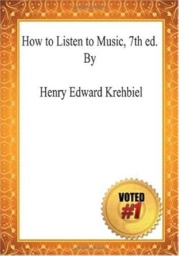

How to Listen to Music, 7th ed. (1896)
by Henry Edward Krehbiel


It is scarcely to be wondered at that when men like Schumann and Chopin felt the full force of the new evangel which Beethoven had preached, they proceeded to carry the formal side of poetic expression, its vehicle, into regions unthought of before their time. The few old forms had now to give way to a large variety. In their work they proceeded from points that were far apart - Schumann's was literary, Chopin's political. In one respect the lists of their pieces which appear most frequently on recital programmes seem to hark back to the suites of two centuries ago - they are sets of short compositions grouped, either by the composer (as is the case with Schumann) or by the performer (as is the case with Chopin in the hands of Mr. Paderewski). Such fantastic musical miniatures as Schumann's "Carnaval" and "Papillons" are eminently characteristic of the composer's intellectual and emotional nature, which in his university days had fallen under the spell of literary romanticism🏁
Global Leaderboard
| # | Player | Time | Duration | Accuracy | WPM | pp | |
|---|---|---|---|---|---|---|---|
| 1 | |||||||
| 2 | |||||||
| 3 | |||||||
| 4 | |||||||
| 5 | |||||||
| 6 | |||||||
| 7 | |||||||
| 8 | |||||||
| 9 | |||||||
| 10 |


It is scarcely to be wondered at that when men like Schumann and Chopin felt the full force of the new evangel which Beethoven had preached, they proceeded to carry the formal side of poetic expression, its vehicle, into regions unthought of before their time. The few old forms had now to give way to a large variety. In their work they proceeded from points that were far apart - Schumann's was literary, Chopin's political. In one respect the lists of their pieces which appear most frequently on recital programmes seem to hark back to the suites of two centuries ago - they are sets of short compositions grouped, either by the composer (as is the case with Schumann) or by the performer (as is the case with Chopin in the hands of Mr. Paderewski). Such fantastic musical miniatures as Schumann's "Carnaval" and "Papillons" are eminently characteristic of the composer's intellectual and emotional nature, which in his university days had fallen under the spell of literary romanticism🏁